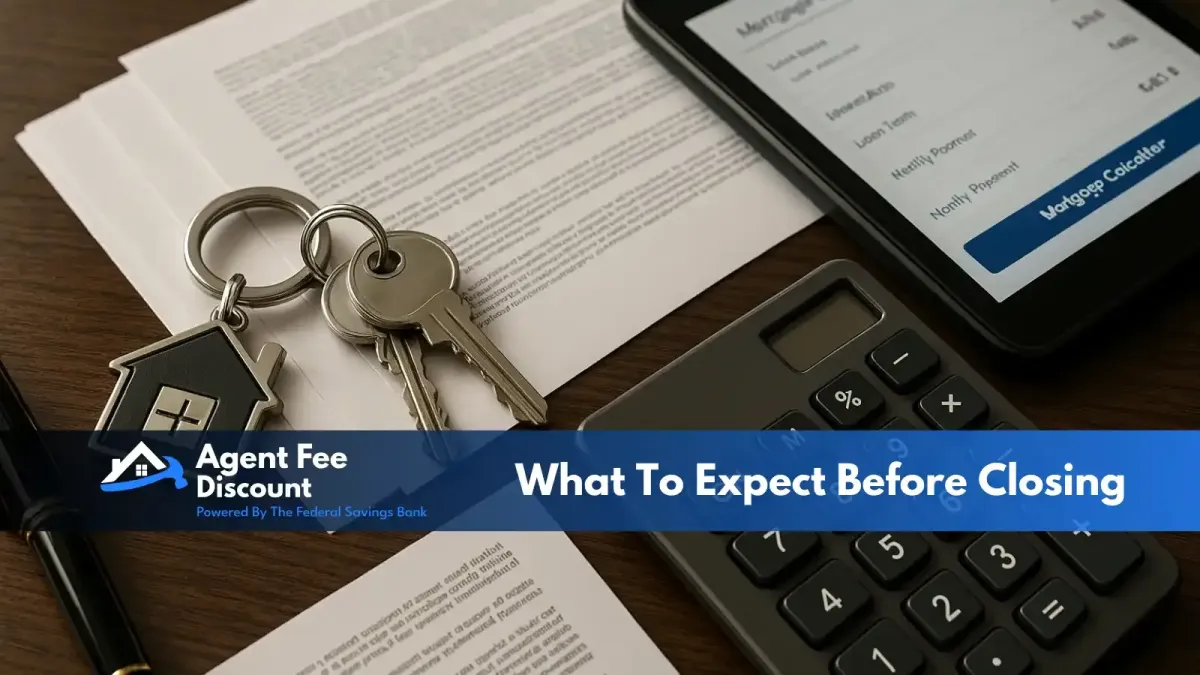
The Hidden Costs of Buying a Home (And How to Avoid Them)
What if you could sell your home and walk away with an extra $3,600—or more—in your pocket? It's not a dream; it's what happens when you take control of real estate commissions.
Buying a home is exciting, but hidden costs can sneak up and stretch your budget faster than you can say "closing day." Whether you're searching for "homes for sale near me" or planning your first purchase, understanding these expenses is crucial to avoiding financial shock.
The truth?
Most homebuyers focus solely on down payments and monthly mortgage payments while completely overlooking the 2-5% in additional costs that can derail their finances. These hidden expenses add up to thousands—sometimes tens of thousands—that weren't part of your original calculations.
Let's cut through the confusion and reveal exactly what you'll be paying beyond the sticker price—and more importantly, how to minimize these costs.
What Are the Hidden Costs of Buying a Home?
Hidden costs extend far beyond your down payment and mortgage amount. Research suggests these expenses typically add 2% to 5% to your purchase price. On a $400,000 home, that's $8,000 to $20,000 in unexpected costs!
Why These Costs Matter
First-time buyers are especially vulnerable to these surprise expenses. When you've stretched your budget to make a down payment, the last thing you need is thousands in unexpected costs.
Consider this: Ongoing expenses like maintenance, utilities, and HOA fees alone can exceed $1,500 annually. That's $125 monthly you might not have factored into your budget.
Common Hidden Costs Overview
These costs generally fall into five categories:
(1) Pre-purchase expenses (before closing)
(2) Closing costs (at signing)
(3) Ongoing expenses (monthly/annual)
(4) Initial setup costs (moving in)
(5) Unexpected expenses (surprises)
Each category contains multiple expenses that can significantly impact your financial picture. Let's break them down.


Pre-Purchase Costs: What to Expect Before Closing
Before you ever get the keys, you'll encounter several expenses that demand immediate payment.
Home Inspection
Cost: $300–$500
This crucial step identifies potential problems like structural damage, electrical issues, or pest infestations. While it might be tempting to skip this to save money, a thorough inspection often uncovers issues that could cost thousands to fix later.
Pro Tip: Use inspection reports to negotiate repairs or price reductions. A $500 inspection could save you $5,000 in repair costs.
Appraisal
Cost: $300–$1000
Lenders require appraisals to verify the home's value matches the loan amount. This protects them—and you—from overpaying.
Pro Tip: Ensure your home is in top condition for the appraisal. Simple cleaning and minor fixes can improve the appraiser's impression.
Title Search and Insurance
Cost: Varies by location and home value
This protects against ownership disputes and ensures the seller has the legal right to transfer the property. There are two types: owner's policies and lender's policies.
Pro Tip: Shop around for quotes. You can save up to 20% by comparing title insurance providers.
Survey If Needed
Cost: $400–$800
Not always required, but essential if there are questions about property boundaries or potential encroachments.
Pro Tip: Budget for this if you're buying a property with unusual features or if the boundary lines aren't clearly defined.
Closing Costs: The Fees at the Finish Line
These are the expenses paid when you sign the final paperwork—and they're often the most shocking to unprepared buyers.
Loan Origination Fees
These are the expenses paid when you sign the final paperwork—and they're often the most shocking to unprepared buyers.
Cost: 0.5%–1% of loan amount
This covers the lender's administrative costs for processing your application.
Pro Tip: Compare rates from multiple lenders. Some offer lower origination fees to win your business.
Underwriting Fees
Cost: $300–$900
Pays for the lender's assessment of your financial situation and risk level.
Pro Tip: Avoid delays by promptly providing all requested documentation. Time is money when it comes to underwriting.
Recording Fees
Cost: 0.1%–0.5% of purchase price
Government charges for officially recording your deed and mortgage.
Pro Tip: These vary by location, so research local rates for more accurate budgeting.
Prepaid Items
Cost: 0.1%–0.5% of purchase price
Includes property taxes, homeowners insurance, and HOA fees that must be paid upfront, often covering several months in advance.
Pro Tip: Factor these into your closing budget—they're often overlooked but can add thousands to your closing costs.
Legal Fees (If Applicable)
Cost: $500–$1,500
Some states require attorney involvement in real estate transactions.
Pro Tip: Check local requirements early and budget accordingly.


Ongoing Costs: What You'll Pay After Moving In
The expenses don't stop once you get the keys. These recurring costs can significantly impact your monthly budget.
Property Taxes
Cost: 1%–2% of assessed value annually
This unavoidable expense varies dramatically by location and funds local services and schools.
Pro Tip: Use online calculators to estimate property taxes in specific neighborhoods before making an offer. This is crucial when searching for "buying a home near me."
Homeowners Insurance
Cost: $1,000–$3,000 annually
Required by lenders and protects against damage to your property.
Pro Tip: Bundle with auto insurance for potential discounts of 10-15%.
Utilities
Cost: $200–$500+ monthly
Electricity, water, gas, internet, and trash service—these essential services add up quickly, especially for larger homes.
Pro Tip: Research local utility averages and consider energy efficiency when house hunting. High utility costs can make an otherwise affordable home much more expensive.
Maintenance and Repairs
Cost: Budget 1% of home value annually
Regular upkeep and unexpected fixes ensure your home retains its value and remains safe.
Pro Tip: Set aside funds specifically for home maintenance. When the HVAC system fails in July, you'll be glad you did.
HOA Fees (If Applicable)
Cost: $100–$500+ monthly
If you buy in a planned development or condominium, these fees cover common area maintenance and amenities.
Pro Tip: Review HOA financial statements before buying. An underfunded HOA often leads to special assessments—surprise bills that can run into thousands.
Local Fees (e.g., Parking Permits)
Cost: $100–$500 annually
Here's something most buyers never consider: some urban areas charge for street parking permits and other local services.
Pro Tip: Check with the local government about any neighborhood-specific fees before making an offer. This unexpected detail can affect your budget significantly.

Initial Setup Costs: Making the House a Home
The expenses continue even after closing as you transform your new house into a home.
Moving Costs
Cost: $800–$5,000+
Whether you DIY or hire professionals, moving expenses vary based on distance and volume.
Pro Tip: Compare quotes from multiple movers and consider off-peak timing for better rates.
Furniture and Decor
Cost: $5,000–$20,000+
Unless you're bringing everything from your previous home, you'll likely need new furniture to fill your space.
Pro Tip: Prioritize essential pieces and look for quality second-hand options or sales to spread costs over time.
Redecorating
Cost: $1,000–$10,000+
Paint, flooring, window treatments, and minor updates can transform a space but add up quickly.
Pro Tip: Prioritize necessary changes (like lead paint removal) over cosmetic upgrades that can wait.

Unexpected Costs: Preparing for the Unforeseen
Even with careful planning, surprises happen. Smart homebuyers prepare for these contingencies.
Pest Control
Cost: $300–$5,000+
Termites, mold, or rodents can require immediate—and costly—attention.
Pro Tip: Include pest inspection as part of your home inspection process to identify issues early.
Major Repairs
Cost: $1,000–$15,000+
Roof replacements, HVAC systems, and plumbing failures represent significant, often urgent expenses.
Pro Tip: Consider a home warranty for the first year to mitigate potential large repair costs while you build your emergency fund.
What to Do Before Buying a Home
Preparation is your best defense against hidden costs. These steps can save you thousands.
Steps to Take Before You Start House Hunting
Save beyond your down payment (aim for 5% extra)
Get pre-approved to understand your true budget
Research neighborhoods thoroughly using "homes for sale near me" searches
Understand all potential costs, not just the mortgage payment
Pro Tip: Know your complete budget before falling in love with any property. Emotional decisions often lead to financial strain.
Understanding Your Budget
Calculate all anticipated costs, including the hidden expenses outlined above.
Pro Tip: Use comprehensive mortgage calculators that include taxes, insurance, and maintenance—not just principal and interest.
What First-Time Home Buyers Need to Know
If you're new to homeownership, these insights are particularly valuable.
Common Mistakes to Avoid
Underestimating total costs of ownership
Skipping inspections to save money
Failing to budget for ongoing and unexpected expenses
Emptying savings for down payment, leaving nothing for emergencies
Pro Tip: Educate yourself through resources like this article before making what might be the largest purchase of your life.
Resources for First-Time Buyers
FHA loans offer lower down payment requirements
First-time buyer programs provide grants or favorable terms
Real estate agent fee calculators help estimate total transaction costs
Pro Tip: Leverage available tools and resources to make informed decisions and potentially access financial assistance.

How Agent Fee Discount Can Help
Smart home buyers know that saving on every aspect of the transaction adds up to significant benefits.
Save on Real Estate Commissions
Our exclusive partnerships with top agents nationwide allow us to offer up to 30% off standard commission rates.
Here's the math: On a $400,000 home with a 3% commission to your side of the transaction ($12,000), saving 30% means keeping $3,600 in your pocket—money that could cover most of your closing costs or build your emergency fund for those inevitable home repairs.
Pro Tip: Reducing overall transaction costs frees up funds to address the hidden expenses we've outlined, making homeownership more affordable and less stressful.
Access Extra Funds
For qualified borrowers, our consumer loan offers up to *$50,000 in additional funds—perfect for covering hidden costs like home renovations, emergency repairs, or essential furnishings.
Pro Tip: Use these funds strategically for improvements that increase home value or address potential problems before they worsen.

Take Control of Your Home Buying Journey
Hidden costs don't have to derail your homeownership dreams. With proper planning, research, and strategic partnerships, you can navigate these expenses successfully.
The key takeaways:
Budget an extra 2-5% beyond your down payment for hidden costs
Research thoroughly before making offers, especially for neighborhood-specific expenses
Leverage services like AgentFeeSavings.com to save up to **30% on commissions and access up to *$50,000 in additional funds
Build emergency savings specifically for home-related surprises
Whether you're actively searching for "houses for sale near me" or just starting to consider homeownership, these strategies will help you avoid costly surprises and make your transition to homeowner smooth and financially sound.
Ready to take the next step? Visit AgentFeeSavings.com today to discover how our commission savings and consumer loan programs can transform your home buying experience and help you avoid the financial stress that catches so many buyers off guard.

Call Us 24/7
(844) 999-0639
To speak with a banker or check program eligibility, call anytime.



